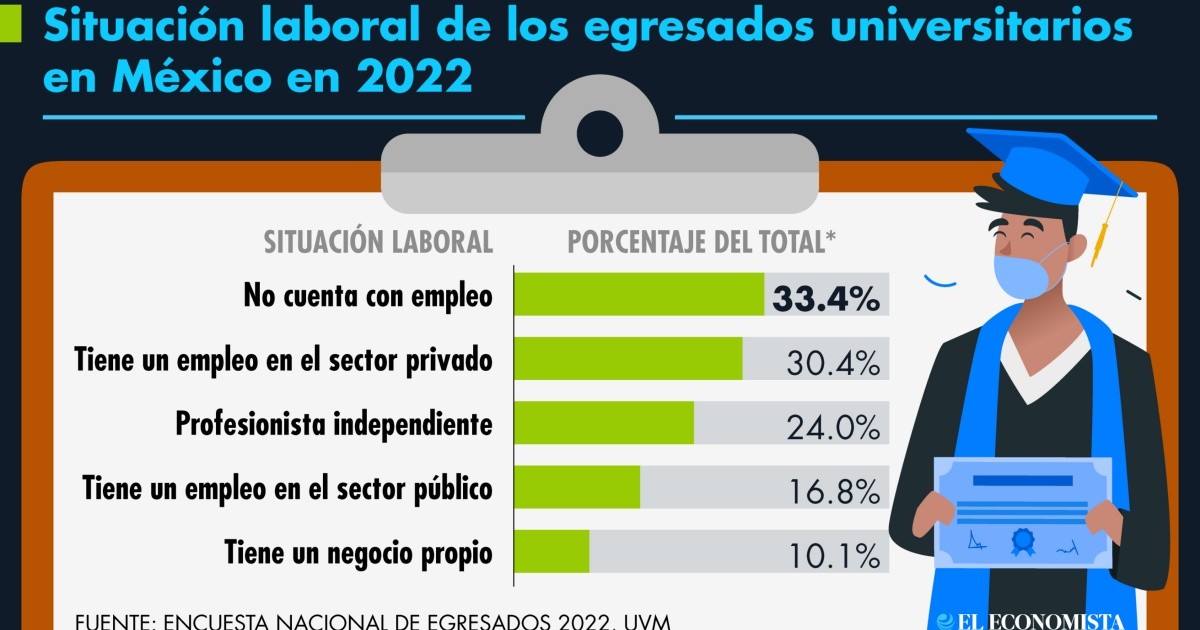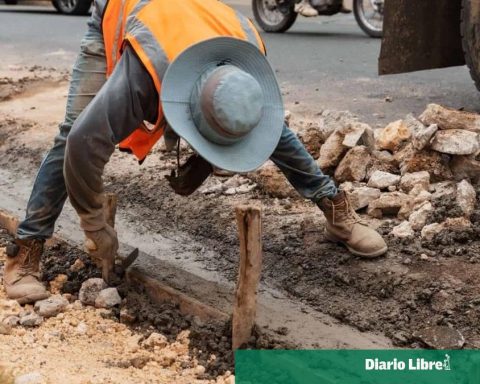The lack of job opportunities and quality jobs pushes young university students to take refuge in the independent work; they become self-employed out of necessity, not by decision. Although higher education maintains an important bonus as a way to improve access to the job market.
“In reality, young people are looking for a stable, formal job, with all the benefits of the law and with a decent salary, and unfortunately it is not what we see in the labor market conditions current. Indeed, there are not many options for the majority of young people and the options that do exist are precarious jobs,” says Angélica Jasso, technical secretary of the organization Alianza Jóvenes con Trabajo Digno.
According to the National Graduates Survey 2022 (ENE) of the University of the Valley of Mexico (UVM), the alternative of independent work was the one that grew the most in the last year among college youth. Currently, 24% of graduates work under this modality, an increase of five points compared to 2021.
Also, the 39% of graduates who works independently does so because he couldn’t find a job. This figure is practically double the number of young people who say they opted for this modality favoring time management and is seven times higher than the proportion who say they preferred self-employment because “they like to be their own boss.”
“It is undeniable that despite other reasons such as managing your time or being your own boss, without a doubt the growth of the independent work It responded to the need to mitigate unemployment, but also to the urgency of the graduate to have a job and that this money can be integrated into household expenses,” says Adriana Rico Villanueva, coordinator of the Center for Public Opinion (COP) of the UVM. .
According to the ENE, at 89% of graduates With self-employment, he would like to change his work modality, an increase of seven points compared to the last measurement. The higher the level of dissatisfaction with the independent modality, the greater the tendency to want to leave this employment condition. But even among those who are very satisfied with this scheme, the proportion who want other types of work is over 60 percent.
For Angélica Jasso, the narrative that young people no longer commit themselves, are not responsible, want to be their own bosses and want a lot of free time, has only generated stigmas around the young workforce and has contributed to the precariousness of job opportunities.
“Independent work is presented as an important income alternative for many young people, because it is being difficult for them to find work and the jobs that are in the labor market They are not jobs that we call decentthat is, they comply with all the benefits of the Law and that they offer a decent salary ”, he exposes.
As proof of this, among graduates who do have a job, 51% report that they would like to change to a job where they have a plant contract. Along the same lines, 29% of university students with a subordinate job do not have legal benefits.
“When young people get their first job there is a certain vulnerability and precarious conditions that are compounded as they acquire work experience. However, if we compare the data with the pre-pandemic figures, we see an affectation, especially among those who have benefits that are higher than those of the law”, indicates Adriana Rico.
According to research by the Adecco Group, the 40% of young people in Mexico points out that they have not been able to get a job because there are few job opportunities, but 26% attribute this to low wages and 15% to poor working conditions.
The survey also shows the impact of the pandemic on youth employment. 43% of young people looking for a job lost their job due to the health emergency caused by Covid-19. Of this universe, four out of 10 have not found a job since the health emergency began.
College education, still with employment advantage
Despite the perception of university graduates about the labor market, figures from the Organization for Economic Cooperation and Development (OECD) show that the higher education maintains an advantage for young people who want to access a job.
A higher educational level is often associated with better job prospects, and Mexico is no exception. In Mexico, in 2021, 44% of women with a level of education below the upper secondary level were employed, compared to 74% of tertiary education graduates. On the other hand, in the case of men, the figures were 89% and 86%, respectively”, highlights the agency in its report on Education Panorama 2022.
In addition to the better chances of entering a subordinate job, another labor advantage offered by university education is that it continues to be linked to better wages compared to people without higher education.
The level of education not only affects the prospects in the labor marketbut also salary levels. In Mexico, the wage advantage for workers with tertiary education was even higher than the OECD average. In 2018, workers with upper secondary education earned 34% more than those with an educational level lower than upper secondary, and those with tertiary education earned more than double, “says the agency.
In this vein, Angélica Jasso points out that one cannot lose sight of how complex the world of work for young people who have not been able to study at the university.
“If the first steps in the labor market It is difficult for young university students, even though they are already on a higher social level, most of the young people with whom we work do not have the opportunity to go to university, live in poverty, have an educational gap and live in areas with a high rate of marginalization or violence, which implies prejudices on the part of employers when they appear for a job interview”, he warns.

Labor market with entry barriers
From a general perspective, graduates perceive a more complex labor market this year and this is reflected in a growth in the job dissatisfactionat least 25% of graduates are not satisfied with their current job and that represents a growth of four points with respect to the last measurement of the ENE.
“We can see how the percentage of job satisfaction The current situation was higher than what we have today and this goes hand in hand with income and conditions, to the extent that these tend to be precarious, the graduate is more dissatisfied with their work”, explains Adriana Rico.
29% of the graduates who are employed in the private sector declare that they do not have benefits; this proportion grew seven percentage points in the last year. In government offices the story is no different, 28% of graduates say they do not have the minimum legal conditionsthis implies a growth of five points compared to what was reported in 2021.
“Faced with such a difficult year to enter the labor market, with lower salaries, even reduced salaries, the percentage that indicated that they would like to change their working modality raised. Similarly, whether due to job uncertainty, pressure or the pandemic itself, the number of graduates satisfied with their jobs decreased, from 78.6 to 73.8%. On the other hand, the dissatisfaction associated with salaries increased, particularly among those with salaries of less than 15,000 pesos”, the UVM highlights in its report.















